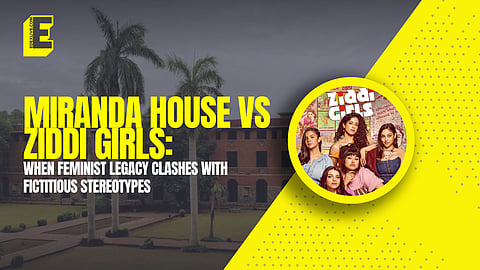

Miranda House, University of Delhi (DU), has always been a beacon of women’s education. It is a space where generations of women have cultivated their intellectual pursuits and honed their activism. As one of India’s most prestigious women’s colleges, it has played a crucial role in shaping feminist discourse and empowering women to break societal barriers.
However, the recent controversy surrounding the Amazon Prime series Ziddi Girls, directed by filmmaker Shonali Bose, an alumna of Miranda House, has sparked outrage among students and alumni, who argue that the show distorts this legacy, reducing their institution to a caricature of privilege and frivolity.
Outrage over misrepresentation
The trailer portrays Miranda House (referred to as Matilda House or MH in the show) students as engaged in frivolous pursuits, hypersexualised activities, and privilege-fueled rivalries.
Many students feel the depiction reduces them to individuals consumed by voyeuristic obsessions and superficial pursuits., completely erasing the intellectual rigour and feminist consciousness that define their institution.
Amisha Nanda, an alumna of Miranda House and Campus Law Centre, DU, and founder of the intersectional feminist organization Auratein Laayengi Inquilab, who also led the 2019 protest against curfew timings in Miranda House hostel, expressed her deep disappointment.
"While creative liberties are understood, warping the legacy of Miranda House is indefensible. As a proud alumna and the flagbearer of a notable 23-day sit-in protest against unjust hostel curfews — where thousands of women from diverse backgrounds united in defiance of police brutality — I vehemently oppose the gross misrepresentation of my alma mater. Miranda House is a crucible of intellectual rigour, feminist consciousness, and unwavering solidarity — not a bastion of privilege, frivolity, or superficial preoccupations."
Rupali Gujral, another Miranda House alumna and a practising intellectual property lawyer, emphasised the real-world consequences of such portrayals.
"Clearly, it’s outrageous to portray a prestigious college like ours in this light. The biggest challenge this misrepresentation poses is that it shakes the confidence of parents whose children are studying at Miranda or wish to get admission into it. It is not just defaming the name of MH but also raising doubts about its alumni," she gravely pointed out.
The patriarchal gaze and women’s spaces
Students from the History Department, which is also the department the film’s director studied in, have voiced strong objections to the portrayal. Yushvita, a student, highlighted the persistent sexualisation of women-only spaces.
"Any women-only space is often viewed through a patriarchal, fetishised lens. Just like how the Mughal harem is often imagined as a site of debauchery, women’s colleges are frequently misrepresented as spaces of unchecked sexuality. Instead of acknowledging the intellectual and emotional depth of women’s friendships and struggles, the show chooses to focus on a hyper-sexualised, party-driven narrative," she opines.
Another student, Nandini, underscored the damage such portrayals can do to the reputation of women’s institutions.
"Even before this series, Miranda House already had to fight against stereotypes. Relatives and neighbours would often warn young women against studying here, saying that girls from MH drink, smoke, and engage in ‘inappropriate behaviour.’ This kind of misrepresentation fuels existing prejudices and can even deter families from allowing their daughters to study here," she says.
Commercialisation at the expense of authenticity
The controversy also brings into focus the role of Amazon Prime in sensationalising the narrative. Students have criticised the platform for prioritising viewership over ethical storytelling.
"Amazon Prime is not an innocent bystander in this. They know their audience and are deliberately exploiting sexist tropes for profit. The trailer has already garnered thousands of comments, most of them negative, but the attention still benefits the platform," Yushvita added.
This commercial exploitation of a prestigious institution’s identity raises broader questions about media accountability and the ethical responsibilities of content creators when depicting real-life spaces and communities.
The betrayal by an alumna?
For many, the most shocking and ironic aspect of this controversy is that Shonali Bose, a Miranda House alumna, is behind the series.
"She was an icon for us. We studied her works in class, and our professors praised her films. But this betrayal cuts deep. How can she not know what kind of damage this portrayal will cause? Even if the show itself turns out to be different, the trailer has already harmed the image of MH," said Nandini.
This raises important debates about the obligations of alumni when representing their alma mater in the media. Should creative expression take precedence over the integrity of an institution’s legacy? Many students and alumni feel that this portrayal is an exploitation rather than an homage.
Responsible storytelling: The need of the hour
Students and alumni are now demanding accountability. They urge the creators to address the concerns, rectify the misrepresentation, and respect the institution’s legacy.
As Ishita, a hostel resident, put it:
"The hostel has been my home for two years — a safe space where I’ve found lifelong friendships and intellectual growth. This portrayal reduces it to a place of scandal and recklessness, which is utterly false. The filmmakers have an ethical responsibility to tell our stories with authenticity, not exploit them for commercial gain."
The backlash against Ziddi Girls is more than just an isolated controversy; it is part of a larger discourse on how women’s spaces are depicted in media and the responsibility of filmmakers to avoid reinforcing harmful stereotypes, as per students. .
Institutions like Miranda House and other women’s colleges have been at the forefront of feminist movements, nurturing generations of trailblazers. The outrage from students and alumni is not merely about a TV show, it is about defending the legacy of these institutions as flag-bearers of empowerment and progress.
As the debate unfolds, the creators of Ziddi Girls now face a crucial decision: to engage with these concerns and uphold authenticity or risk trivialising the very institutions that have shaped generations of strong, independent women.
